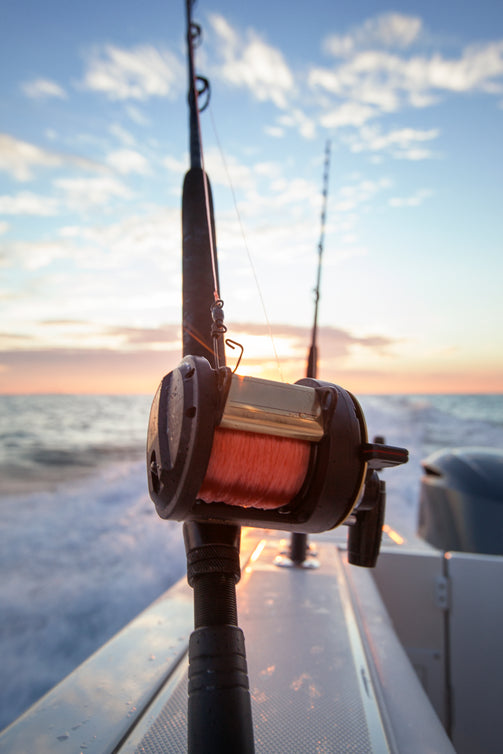
12 Saltwater Fishing Tips for Beginners
Few outdoor activities are as exhilarating as deep sea fishing, the spray of ocean water, the anticipation, and the thrill of the first catch after hours of patience. Because of all the logistics involved in saltwater fishing, many beginner fishermen don't know where to begin. However, it can quickly become your new passion with the right equipment and a few essential saltwater fishing tips.
What is Saltwater Fishing?
Saltwater fishing is often considered big-game, meaning your catches may include much larger species than freshwater fishing. Some of the most common catches include swordfish, sharks, marlin, and tuna. You can do this type of fishing from various sizes of boats, a pier, or the beach, while the game caught from the shores is typically smaller, including bluefish, bonefish, tarpon, and striped bass. Saltwater sport fishing was pioneered at the end of the 1800s but didn't become popular as a sport until the turn of the 21st century. Today, people travel all across the world in search of angling diverse species.
Saltwater Fishing Tips
Knowing where to start if you're interested in pursuing saltwater fishing can be challenging. Here are 12 saltwater fishing tips to remember before your big-game endeavor.
Use the Right Tackle
One type of equipment does not suit all in this exciting sport. Choosing the correct saltwater fishing gear will impact the kind of game you catch. If you're aiming to catch a particular fish, you'll need to pick the right type of pole, line, hook, bait, and lure. Before your adventure, thoroughly research your target species and stock up on the proper supplies.
For example, if you're aiming to catch bigger creatures like tuna, dolphins, or sailfish, you'll want to use a hefty line that is less likely to break at the lure or bait. This copper fishing wire sinks more rapidly than other variations and is ideal for deep sea fishing. Also, consider using trolling weights and selecting the right bait or lure.
Change Your Line Often
Speaking of lines, you may need to change your line more often with saltwater fishing. The salt is a little harder on your equipment, so keep an eye on your line. If it begins to feel rough or looks dull, you may want to replace it. Nothing is worse than a broken line when you finally get your big catch! Invest in high-quality, durable line to avoid frequent replacement or breakage.
Long Leaders
Having a long leader as a part of your saltwater fishing gear can improve your likelihood of a catch by allowing the fish to swim more naturally.
Safety First
Safety is of the utmost importance when saltwater fishing. Ensure that everyone on your boat wears a life jacket to prevent unfortunate accidents. Avoid fishing in off-limit areas and check sun, moon, wind, weather, and tide reports. Keep knives and other sharp equipment in cases and out of reach of any children. You'll also want to pack items that may be useful in an emergency.
Some of these may include:
- Plenty of food and water
- A map
- Flashlights
- A cell phone or radio
- A first-aid kit
Use Circle Hooks
The best fishermen today know that circular hooks are a must-have for your saltwater fishing gear. Traditional J-shaped hooks are more likely to become embedded deep in the fish's throat, increasing the chances that they swallow it or, worse, die. Typically, circle hooks are more likely to grasp the fish's lip, which increases the likelihood of survival. They're also easier to remove, allowing for a greater survival for fish you do not intend to keep.
Be a Responsible Angler
As a saltwater fisherman, you are accountable for responsible and ethical angling. Educate yourself on regulations regarding your chosen fishing area and treat all game with gentle care and respect. Respect natural ecosystems by ensuring all trash and waste stays in the boat throughout your endeavor and is appropriately disposed of afterward. Being a responsible angler protects the survival of species and secures the future of sport fishing.
Handle Game With Care
Another part of being a respectful angler is handling each catch respectfully. Wet your hands before touching the game to avoid introducing the fish to anything unnatural such as insect repellent or other chemicals.
Use Shiny, New Lures
Try using new lures for optimal results when saltwater fishing. New lures are brighter, shinier, and more attractive to fish. This pack of 10 metallic 8" Trolling Lures has crystal resin heads with 3D holographs, sure to capture the attention of big game. Take good care of your lures to prevent them from getting dull or rusty too fast.
Understand Currents and Tides
The water movement will significantly impact the potential species you may catch during your saltwater fishing trip. In open water areas, the tide's height will influence the fish, whereas they respond more to the speed and direction at channel entrances and inlets.
Know Your Knots
If you've fished before, you probably know some basic knots. For saltwater fishing, perfecting your knot tying skills is crucial to prevent losing any big catches.
The Heavier the Gear, the Better
If you're trying to decide between slightly lighter gear or something more substantial, go heavier if you’re a beginner. There is a lot more opportunity to catch big game when it comes to saltwater fishing. Preparing for a bigger catch is exciting and makes the experience more thrilling.
Tag Along
If you're still overwhelmed by the idea of saltwater fishing, tag along on someone else's trip! Going with an experienced fisherman who can show you the ropes can give you the experience you need to plan your adventure.
Reel it in With These Saltwater Fishing Tips
Hopefully, these saltwater fishing tips will prepare you to secure an exciting catch on your big day! Remember that saltwater fishing takes diligent patience and practice. Stock up on the best gear and enjoy this rewarding, exciting type of sport fishing.


























